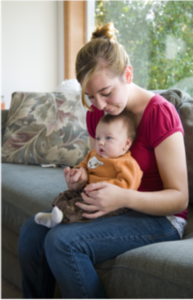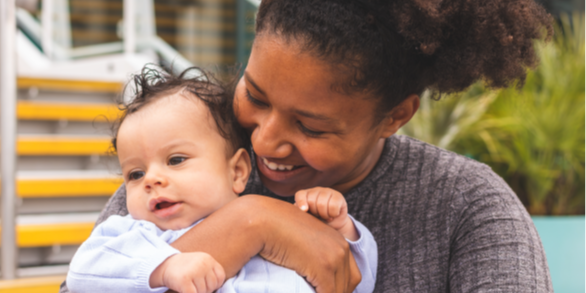Is parent & child (also known as mother & baby) fostering something that you had heard about and thought ‘I wonder what that is?’ or perhaps this is a term that is totally new to you? Hopefully we will be able to answer some of your queries below!
Parent & child fostering is a type of fostering where parents can be supported alongside their children within a foster family. This usually involves placing a baby or child, along with either one or both parents, in a foster home where they can learn to cope with parenthood in a safe and secure environment. In some cases, the parent has become a parent at a very young age and, for one reason or another, cannot remain in their own family homes. The parent, usually mum, will need some extra help and advice so that they can learn to safely care for their baby on their own.
Foster carers need to have a broad range of skills and qualities, including being a great listener, having a good sense of humour, being optimistic, having their feet firmly on the ground and showing resilience. They must also be able to offer the time, commitment, space, and skills to care for parents who are struggling to care for their young children.
What are the benefits of parent and child fostering?
Parent & child fostering brings with it benefits for both the child and parents involved. Firstly, the child or infant benefits from being in a stable family environment and usually the parent gains invaluable emotional support as well as learning the skills required for motherhood, such as how to hold or feed a baby. Young parents may also have the opportunity to carry on with their studies and complete schooling with the extra support provided.
What is required of a parent and child foster carer?
The fostering assessment and matching process is thorough and will always aim to place a parent and child in the best possible foster family.
To be an effective foster carer in a parent and child fostering placement, there are numerous qualities and skills a person needs. These include:
- The ability to treat new parents with sensitivity
- Assertiveness and the confidence to lead by example
- Observational skills and the willingness to observe and record how the parent looks after the child, whilst being unobtrusive
- Patience and encouragement when passing on advice and parenting skills
Foster carers stay in close communication with the supporting social worker and are expected to contribute to reviews and meetings to report on the progress of the placement.
By providing a consistent support network the aim is that the child and parent are given the best possible chance to grow and develop in a nurturing environment. Flintshire Council give a good insight into some of the queries that we often have from people interested in this type of placement.

Top Ten Frequently Asked Questions
- Who are the parents?
The parents are sometimes young teenage mothers (or occasionally fathers) but can be older parents in their twenties or thirties, or sometimes both parents together. They’ve often experienced poor parenting themselves. They’ve had a difficult childhood or been in care themselves. Some parents might have a mental health condition which means they need extra support and observation.
Often the mums don’t have the support of family and friends around them. They may have been a victim of domestic abuse. The mums are usually vulnerable women who have very low self-esteem and lack confidence.
- Why does the parent need support?
The parent usually has been directed to a parent & child assessment placement as they need guidance and support, to parent their child. They need to show that they can keep their baby safe. Often they have not experienced positive parenting themselves, so can really struggle to know what their child needs. Some parents manage the practical side of caring for a child easily, such as making up feeds, washing clothes, changing nappies etc, but really struggle to give their child the emotional warmth they so desperately need.
Often the parent struggles to understand the importance of providing a stimulating environment. They might be on their phone or watching TV and not give their full attention to their child. This lack of stimulation can impact the child’s development.
Foster carers have additional training, as well as the main foster carer training, to be able to provide this support and guidance. They will prompt the parents to carry out tasks, they will explain to them how they can improve. They will praise them when they are doing well. Building confidence and self-esteem is an important part of the foster carer’s role. You will also be working with other professionals to do this.
- Do parent and child placements work?
Parent & child foster placements give parents a fantastic opportunity to learn how to look after their child well. They can prove to themselves and others that they have the ability and actually want to achieve. Parent and child together foster placements do work. Parents who want to achieve, often do.
Some parents find caring for their children too difficult. They sometimes struggle to prioritise the needs of their child above their own. This may be because of a pull towards an abusive partner. It may be influenced by drug addiction. The parents may have a learning need that affects their ability to develop their parenting skills. It may be that the parent just can’t do it because emotionally it is too much for them.
- Where does the baby sleep and who does the night feeds?
The baby usually sleeps in their parent’s room. If the parent is considered a risk, then the foster carer would be given guidance to care for the baby in their room.
The parents are expected to do all the feeds eventually. Initially, the foster carers will provide as much support as is needed, this can be up to 24 hours of supervision and support. If the parent needs support with night feeds, the carer is up in the night with them to do this.
Over time, the parents should feel more confident and will manage all feeds without support from the foster carer. This varies from one parent to another. Some parents pick this up really quickly, whilst other parents take much longer.
It can be difficult for some parents to recognise what the child needs from their cry. Are they crying because they are hungry, are they tired, do they have wind? The foster carers will support the parent to identify what it is the child is crying for.
- As a foster carer, what do I need to be looking for?
As a foster carer, you will be observing all of the time. Is the parent giving their child their full attention? Is the parent spending more time on their phone than with their child? How long does the parent leave the child to cry? Can the parent manage more than one thing at once e.g., if the parent focuses on interacting with the child does the housework then slip? Is the parent able to do chores?
Is the child dressed inappropriate clothing? Are they warm or cool enough? How patient is the parent with the child? Are they sensitive to the child’s needs or are they impatient and shout at the child?
Is the parent sticking to the plan of who does what? When the parent goes out without the child is this planned, or do they walk out leaving the child in the carers care with little or no notice? Do they prepare the child’s bottles before they go out or do they expect the foster carer to do this?
How does the parent communicate with the foster carer? Are they willing to learn or are they obstructive and confrontational?
- Is the partner/other parents safe?
Not always, however, if partners pose a risk to the child they will not be allowed access to the child. The foster carer’s address will be kept anonymous and not shared with anyone. Social workers are very clear to parents about the rules regarding safety. Parents sign an agreement when they first come to stay. If the parent discloses the foster carer’s address to a partner who is considered a risk, the fostering placement will end immediately.
- What if I have concerns about the baby’s safety?
The foster carers will record information every day about how well the parent is doing, and any areas that need improvement. The parent is aware from the beginning that they are been observed. Weekly meetings are held with the foster carer, parent and social workers to see how things are going and any observations are shared.
Foster carers receive full support from their supervising social worker. If foster carers are worried about anything, they can phone or email at any time of day, no matter how trivial it is.
The foster carer would report concerns immediately to either their supervising social worker or to the out-of-hours team. The foster carer would then be given appropriate guidance.
- How long do they stay?
Parent (or parents) & child foster placements are usually 12-week assessment placement. A request can be made to the court to extend the date if necessary. This may be because the parenting assessment needs more time, or the parent needs additional support. Sometimes very young parents may also be in foster care themselves, so they stay with their child in the foster home for a much longer period.
- What happens when it goes wrong?
The aim is always to try to keep families together, and often we see the parent successfully go home with their baby. Unfortunately, sometimes the baby’s safety is at risk, or the parent chooses a partner or lifestyle over their child. It is always sad when the baby doesn’t stay with mum or dad. This isn’t the outcome we would hope for the parent or the child. But the reality is that the system is there to protect the child as the number one concern.
- What happens when they move out?
When a parent successfully moves out with their baby, they will continue to receive support from social services. They may move into independent living or somewhere they can continue to receive some support. The child will continue to have a social worker until the parent is able to keep their child safe without any additional support.
Other things to consider
Parent & child fostering is an important way to safeguard children whilst keeping them with their parents during a time of assessment, and the need for this type of placement is high. As a parent & child foster carer, there are various practical requirements that you will need including:
- Having a good-sized bedroom available that can fit a parent and a cot
- Being a full-time foster carer so you can effectively monitor, support and safeguard
- Being able to drive and have use of a car to get to meetings, medical appointments etc.
- Having a reliable support network to help out at short notice, if and when required
 OK, I’m really interested, what do I do next?
OK, I’m really interested, what do I do next?
We are currently recruiting foster carers in all our regions. If you are interested in becoming a parent & child foster carer, then please get in contact. We will be happy to talk through the process and can email you our dedicated parent & child brochure.
You can also have a look at the links below in relation to parent & child fostering with UK Fostering.
Further Information
https://vimeo.com/478362327 – recording of a UK Fostering parent & child webinar, which gives lots of information about this type of placement
https://ukfostering.org.uk/foster-parent-child-foster-carers-view/ UK Fostering foster carer, Gloria’s blog on why they do parent & child assessments
By Lynsey Dobbs – Senior Recruitment Officer, UK Fostering
Sources
